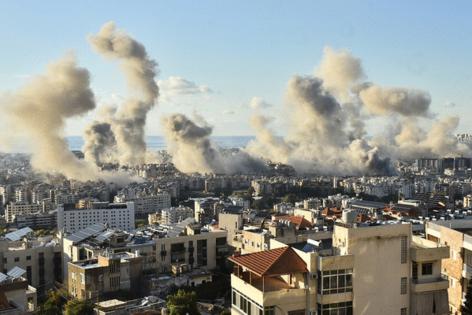Netanyahu says war cabinet to vote on a Lebanon cease-fire plan
Published in News & Features
Israeli Prime Minister Benjamin Netanyahu said he will bring a proposed cease-fire with the Lebanese militant group Hezbollah to a vote in Israel’s security cabinet Tuesday night, potentially paving the way for an end to a war that’s killed thousands of people and forced more than a million to flee their homes.
Netanyahu said in televised remarks Tuesday that a cease-fire would allow Israel to focus “on the Iranian threat,” increase pressure on Hamas in Gaza and free up weapons that have been withheld. The accord was approved earlier by leaders of Iran-backed Hezbollah and of Lebanon.
The deal would pave the way for the two sides to start negotiations for a permanent cease-fire after more than a year of fighting that has destroyed the Lebanon-Israel border area and seen Israel bomb parts of Beirut, as well as other Lebanese cities.
The truce proposal came after one of President Joe Biden’s main Middle East envoys, Amos Hochstein, shuttled between Israel and Lebanon in a bid to end the conflict before President-elect Donald Trump takes over the White House in January. Shortly after Netanyahu’s remarks, the White House said Biden is scheduled to speak at 2:30 p.m. Eastern time.
The talks on a permanent accord would likely be complicated. Israel wants Hezbollah to remove its fighters and weapons from the border region in southern Lebanon, with United Nations forces and the Lebanese military patrolling the area to ensure that happens.
These were the requirements of a U.N. resolution, known as 1701, that ended a 2006 war between the two sides. One key obstacle to a truce in this conflict has been Israel’s insistence on being able to continue striking Hezbollah positions if it thought the group was breaching the terms of any cease-fire agreement. Netanyahu said in his remarks that the duration of the truce depends on developments there. “If Hezbollah chooses to re-arm, we’ll attack,” he said.
Oil and gold prices have fallen this week, with traders optimistic a truce would help calm the Middle East. The Israeli shekel has also strengthened.
Hezbollah, funded and backed by Iran, began firing missiles and drones at Israel on Oct. 8, 2023 in solidarity with Hamas, the Palestinian group that triggered the war in Gaza the previous day when its fighters raided southern Israel, killing 1,200 people. Both Hezbollah and Hamas are designated terrorist organizations by the U.S. and many other countries.
The conflict in Gaza continues to rage, and Israel’s offensive has killed about 44,000 people, according to the Hamas-run health ministry. There’s little indication that a truce in Lebanon would lead to one in Gaza, despite the connection between the two wars.
Hezbollah had long insisted that no cease-fire could be discussed until Israel stopped its war in Gaza, but the weakening of the group’s capabilities since September helped drive it to accept a deal.
In that time, Israel’s military has focused on severely degrading Hezbollah, killing almost its entire top command, including long-standing leader Hassan Nasrallah, and injuring thousands of fighters by detonating their pagers and walkie talkies. It sent troops into southern Lebanon and launched mass airstrikes across the country, destroying tens of thousands of Hezbollah’s rockets and missiles.
About 3,100 people have been killed in Lebanon by the Israeli strikes and ground offensive in the past two months, and 1.2 million — more than a fifth of the population — have been displaced.
Even as Israel’s security cabinet was deliberating the cease-fire its air force conducted some of its heaviest strikes yet on Beirut.
Netanyahu said Israel’s escalation was necessary because diplomatic efforts by the likes of the U.S. and France had failed to stop Hezbollah’s strikes on his country. Those caused tens of thousands of northern Israelis to leave their homes. A similar number of people have been displaced from southern Lebanon.
Within Israel, Netanyahu has been under pressure to enable civilians to return to their homes in the north, something the government said would be possible only with a cease-fire and Hezbollah being forced out the border region.
--------
With assistance from Ethan Bronner.
©2024 Bloomberg L.P. Visit bloomberg.com. Distributed by Tribune Content Agency, LLC.







Comments